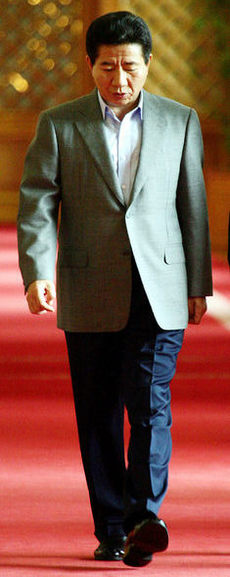 |
Strong criticism of Japan’s UN draft directly from president, sources say
Reportedly following President Roh Moo-hyun’s position on the matter, the presidential office in Seoul strongly criticized Japanese cabinet ministers’ remarks that North Korea’s missile tests were "aggressive." The Ministry of Foreign Affairs and Trade summoned Japanese ambassador to Korea Shotaro Oshima to Seoul on July 10 to raise objection to Tokyo’s move to push ahead a U.N. resolution against Pyongyang. The office of the chief presidential secretary for public relations remarked, "we have no reason to make a fuss about the situation, like Japan has." Presidential spokesperson Jung Tae-ho said in a July 11 press briefing that the president had been told of the remarks and had "no reaction." A participant in the conference, however, was more direct, saying that the remarks were "the president’s will." President Roh’s policy, observers say, is to offer a strong reaction against Japan because he thinks it is attempting to deliberately raise tensions on the Korean Peninsula in order to become a military power once again. In particular, the U.N. resolution that would impose sanctions on the North, drafted by Japan, is based on Chapter VII of the U.N. Charter, which authorizes the use of force to counter an international threat. The president finds such a move by Japan unacceptable, sources say.A key aide of the presidential office said, "The government is not opposed to the U.N. resolution itself. We can support the resolution if it is based on Chapter VI [of the UN Charter], which is about a peaceful solution. Instead, [it is based on] Chapter VII, which means a war on the Korean Peninsula." A high-ranking official of South Korean government, also on condition of anonymity, said that "there exists South Korea-U.S. partnership, but no South Korea-Japan partnership. We cannot deny the fact that in the short term and in a microcosmic point of view, Pyongyang is a direct security threat, but in the long term and historically, Tokyo is a security threat. The biggest mistake by North Korea is that it has paved the way for Japan to become a military power," he added. When the missile crisis broke out, the presidential office initially attempted to restrain itself from making remarks against Japan, sources said, due in part to a request from Washington. According to the sources, U.S. National Security Adviser Steven Hadley urged Deputy Foreign Minister Song Min-soon, on a visit to Washington, that in order to "maintain an international cooperation against North Korea," Seoul would have to be "prudent in making public criticism of Japan." The presidential office, however, thinks that even the U.S. is embarrassed at Japan’s unilateral moves. An official in the office said that the U.S. is willing to lower the severity of the resolution as a result of consultations with China. "The U.S. also thinks Japan is moving too fast," the official said. Seoul is not expected to drive a substantial wedge between it and Tokyo, as it wants to see resumption of the six-party talks, which include both governments. The Seoul government official said that "to be united in voice is important, but what kind of unified voice to make is more important. Even if we criticize Japan, the efforts to resume the six-nation talks will not fail." The solution will be more effective in the long run, the official said, if others would "apply the brakes" on Japan.






